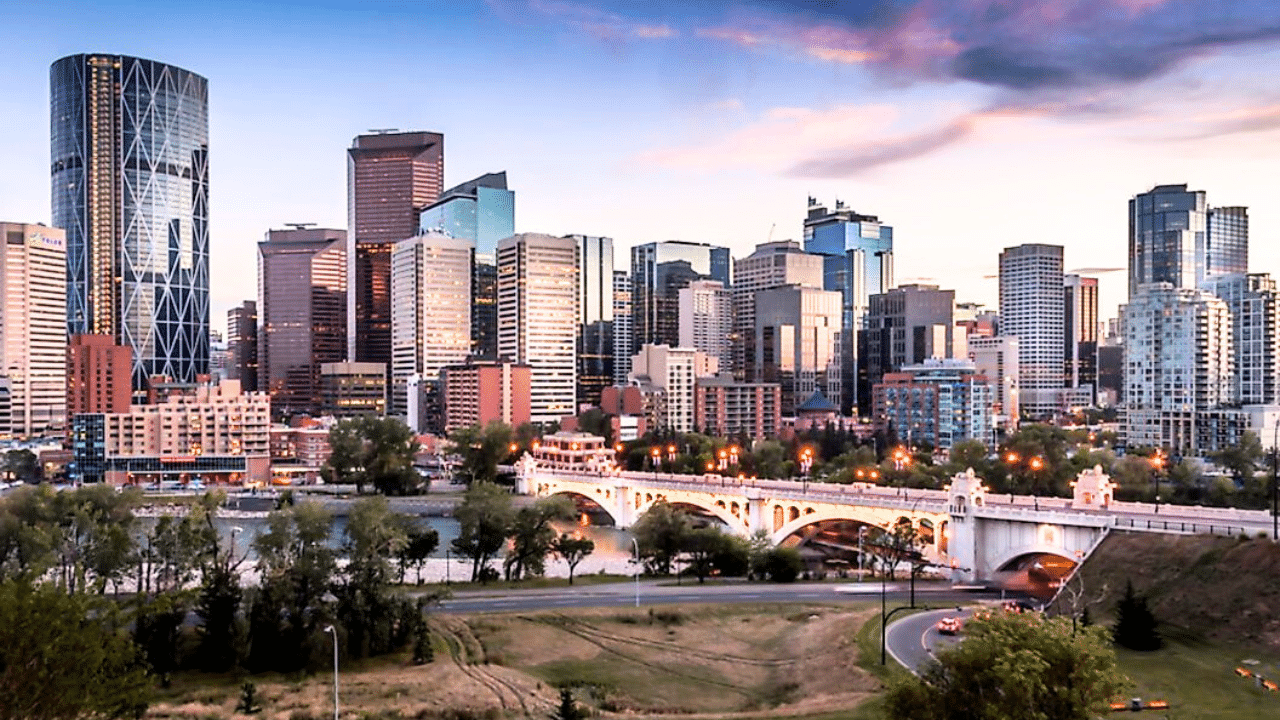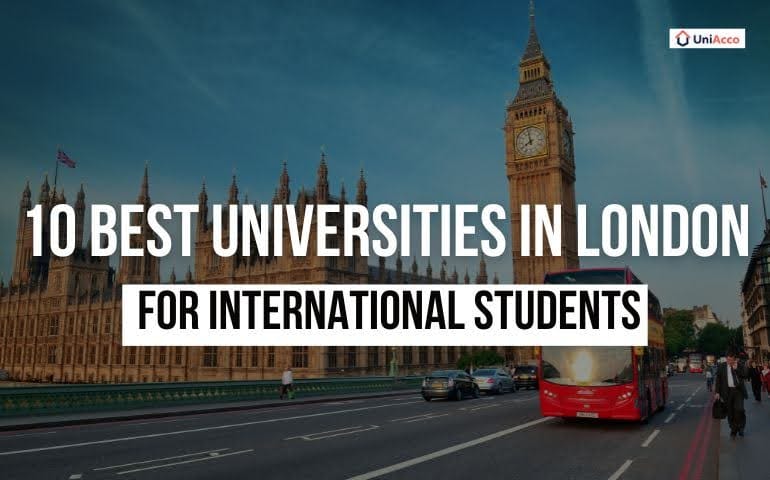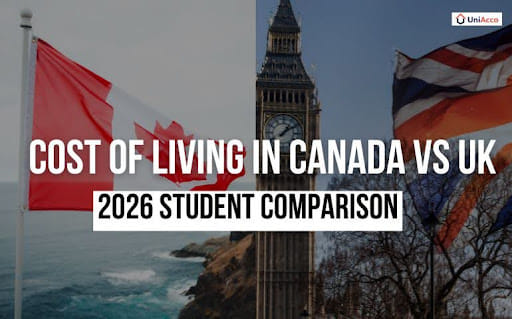Alberta, a western province of Canada, is renowned for its diverse landscapes, thriving economy, and warm, welcoming atmosphere. It is no wonder Alberta is considered one of the best places to live, especially for students planning to move to Canada. If you are thinking of making Alberta your new home, it’s crucial to understand the costs that come with it. From rent and groceries to accommodations and travel expenses, knowing what to expect will help you budget effectively. In this blog, we have broken down the cost of living in Alberta to help you prepare for your move.
Cost Of Living Calculator
| Description | Cost (£) |
|---|---|
| Total Cost of Accommodation | 100 |
| Total Cost of Transport | 50 |
| Total Cost of Utilities | 30 |
| Total Cost of Food | 70 |
| Total Estimated Cost | 250 |
Average Cost Of Living In Alberta For Students
As a student living in Alberta, you will encounter a variety of expenses that are essential to plan for. Whether you live on-campus or rent off-campus, managing your budget is vital. Below, we have outlined some of the most common average costs you must account for during your time in Alberta.
| Item | Cost (Per Month in CA$ ) |
| Off-Campus Accommodation | 700 – 800 |
| On-Campus Accommodation | 1300 – 1500 |
| Transportation | 100 – 300 |
| Food | 700 – 900 |
| Entertainment | 60 – 100 |
| Groceries | 100 – 165 |
| Clothes | 130 – 200 |
Detailed Breakdown Of The Cost of Living In Alberta
Your monthly expenses vary widely depending on factors such as your location within the province, the type of accommodation you choose, and your lifestyle and spending habits. This section will provide a detailed breakdown of these costs to help you understand what to expect and how to plan your budget accordingly.
Groceries
The cost of food and other necessities in Alberta can vary depending on where you shop and your dietary preferences. Shopping at discount stores, utilising loyalty programmes, and cooking meals at home can help save money.
| Items | Cost ( CA$ ) |
| Milk (regular), (1 litre) | 2 – 3 |
| Loaf of Fresh White Bread (500g) | 3 – 4 |
| Rice (white), (1kg) | 3 – 5 |
| Eggs (regular) (12) | 5 – 6 |
| Local Cheese (1kg) | 20 – 21 |
| Chicken Fillets (1kg) | 18 – 19 |
| Water (1.5 litre bottle) | 2 – 3 |
| Beef Round (1kg) (or Equivalent Back Leg Red Meat) | 21 – 22 |
| Apples (1kg) | 5 – 6 |
| Banana (1kg) | 1 – 2 |
| Oranges (1kg) | 5 – 6 |
| Tomato (1kg) | 5 – 6 |
| Potato (1kg) | 3 – 4 |
| Onion (1kg) | 3 – 4 |
| Lettuce (1 head) | 3 – 4 |
| Bottle of Wine (Mid-Range) | 20 – 25 |
| Domestic Beer (0.5 litre bottle) | 3 – 4 |
| Imported Beer (0.33 litre bottle) | 4 – 6 |
| Cigarettes 20 Pack (Marlboro) | 20 – 25 |
Transport
Transportation is a key expense, especially if you regularly commute to university or work. Fortunately, students in Canada can often take advantage of discounted travel cards, which can help reduce your overall transportation costs. Below, we have provided an approximate breakdown of common transportation expenses to give you a clearer picture of what to expect.
| Transport Mode | Fare ( CA$ ) |
| One-way Ticket (Local Transport) | 3.50 – 4 |
| Monthly Pass (Regular Price) | 115 – 140 |
| Taxi 1 hour Waiting (Normal Tariff) | 40 – 50 |
Leisure And Entertainment
Balancing studies with leisure time is important, and Alberta offers plenty of options to relax and unwind. Whether you prefer hitting the gym, enjoying sports, or watching films, there’s something for everyone to enjoy while sticking to your budget.
| Activity | Average Cost (CA$) |
| Fitness Club, Monthly Fee for 1 Adult | 50 – 120 |
| Tennis Court Rent (1 Hour on Weekend) | 15 – 80 |
| Cinema, International Release, 1 Seat | 15 – 25 |
Healthcare Costs for Students In Alberta
International students in Alberta face various healthcare costs depending on their eligibility for provincial health coverage and the type of insurance they choose. Here’s a breakdown of the potential costs and coverage options:
Alberta Health Care Insurance Plan (AHCIP)
- Eligibility: International students studying at an Alberta institution for at least 12 months can apply for AHCIP. Coverage is free for those who qualify, including costs for doctor visits, lab tests, and hospital stays.
- Coverage Limitations: AHCIP does not cover dental, prescription, or vision care. Students may need additional private insurance to cover these expenses.
Private Health Insurance
- Cost: Students must purchase private health insurance if they are ineligible for AHCIP or studying for less than 12 months. The cost typically ranges from $600 to $900 per year.
- Coverage: Private plans can vary widely. Some may cover dental and vision care, while others may not. It’s essential to review the policy details to ensure adequate coverage.
Cost Of Utilities In Alberta
Understanding how much you will spend on electricity, heating, water, and internet can help you plan better. In this section, we have covered what you can expect to pay for essential services in Alberta. However, if you book your student accommodation with Uniacco, you won’t need to worry about paying utility bills separately, as they are included in the rent.
| Particulars | Price |
| Basic (Electricity, Heating, Cooling, Water, Garbage) for 85m2 Apartment | 250 – 300 |
| Mobile Phone Monthly Plan with Calls and 10GB+ Data | 60- 100 |
| Internet (60 Mbps or More, Unlimited Data, Cable/ADSL) | 65 – 90 |
Top Universities & Their Fees In Alberta
Alberta is home to some of Canada’s most prestigious universities, offering students a wide range of programmes worldwide. Known for its high academic standards, research opportunities, and supportive learning environments, Alberta’s universities attract students seeking quality education and diverse career pathways. Whether you are interested in science, arts, engineering, or technology, Alberta’s top universities provide an excellent foundation for academic and professional success. In this section, we will explore the leading universities in Alberta and the standout programmes they offer.
| University | Popular Courses | Fees |
| University of Alberta | – Bachelor of Science in Agriculture – Bachelor of Arts in Philosophy – Nursing – Petroleum Engineering – Environmental Sciences | Approximately CAD 33,968 per year for undergraduate programmes |
| University of Calgary | – Bachelor of Science – Bachelor of Arts in Anthropology – Master of Architecture – Engineering (Petroleum, Mechanical) | Approximately CAD 35,035 per year for undergraduate programmes CAD 20,873 for postgraduate programmes |
| Mount Royal University | – Bachelor of Arts – Bachelor of Business Administration | Approximately CAD 23,810 – 25,698 per year |
| University of Lethbridge | – Bachelor of Arts – Bachelor of Science – Master of Education | Approximately CAD 17,000 – 20,000 per year |
| Bow Valley College | – Business Administration Diploma – Health and Community Studies | Approximately CAD 6,315 per 3-credit class |
| Southern Alberta Institute of Technology (SAIT) | – Automotive Service Technology – Bachelor of Applied Technology in Petroleum Engineering | Approximately CAD 5,670 per 3-credit class |
| Lethbridge College | – Diploma in Civil Engineering Technology – Certificate in Automotive Systems | Approximately CAD 15,151 per year |
| King’s University | – Bachelor of Arts in History – Bachelor of Arts in Classical Studies | Approximately CAD 12,371 per term |
Tips For Managing Your Budget
The challenge can seem overwhelming when managing your budget, especially as a student or young professional. From balancing rent, groceries, and utilities to squeezing in the occasional treat, financial stress can creep in. But don’t worry- budgeting doesn’t have to mean giving up all your favourite things! It’s all about thoughtful planning and making your money work for you. Below, we have explained a few ways to stay on top of your finances so you can live your best life while keeping your bank account happy.
1. Create a Monthly Budget:
List all your monthly expenses, including rent, utilities, groceries, transportation, and entertainment. Break down your income (such as part-time job earnings, scholarships, or allowances) to see how much you can allocate to each category. Sticking to a budget ensures that you will not overspend and helps you prioritise essential expenses.
2. Take Advantage of Student Discounts
Alberta offers a range of student discounts for public transportation, groceries, clothing, and even entertainment. Get an ISIC (International Student Identity Card) or check with your university for local deals to save money wherever possible.
3. Cook at Home
Eating out can be tempting but quickly drains your budget. Try to prepare meals at home, buy groceries in bulk, and take advantage of sales at local supermarkets. Not only will this save money, but it will also ensure that you eat healthier.
4. Use Public Transportation
While owning a car in Alberta might seem convenient, it can be expensive due to fuel, insurance, and maintenance costs. Instead, consider using public transport, which is both affordable and student-friendly, with monthly passes and discounted rates.
5. Find Affordable Housing
Look for off-campus housing or shared accommodations that fit within your budget. Sharing rent and utilities with roommates can significantly reduce your living costs. Also, check for university-affiliated accommodations that offer student-friendly pricing.
6. Monitor Utility Usage
Pay attention to your electricity, water, and heating usage, especially during Alberta’s colder months. Simple changes like turning off lights when not in use or using energy-efficient appliances can lower utility bills and help you stay within your budget.
7. Plan for Emergencies
It is essential to have a small emergency fund set aside for unexpected expenses like medical costs or sudden repairs. Setting aside monthly money for this fund will give you peace of mind and prevent financial stress.
FAQs
1. What are the benefits of studying in Alberta, Canada?
Alberta offers quality education and excellent career opportunities, all while maintaining competitive tuition rates and an affordable cost of living.
2. What is the largest college in Alberta?
The largest college in Alberta is the University of Alberta, a leading institution known for its comprehensive academic programmes and vibrant campus community.
3. What is Alberta’s minimum wage in 2024?
As of 2024, Alberta’s minimum wage is $15.00 per hour.
4. Which province has more jobs in Canada?
Ontario is the Canadian province with the most job opportunities, having recently emerged as the top province for job openings.
5. Which skills are in demand in Canada?
In Canada, high-demand skills include data literacy, cloud computing, agile project management, artificial intelligence and machine learning, cybersecurity and skilled trades.
We hope you found this blog helpful. For more interesting reads, check out the related articles below.















0 Comments